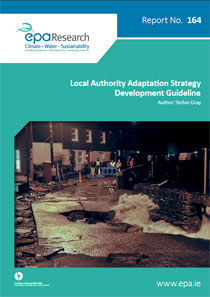Author: Stefan Gray
Summary: The purpose of this guideline is to support local authorities in the development of a local climate change adaptation strategy. In its structure and content, the guideline draws heavily on the 2013 Guidelines on Developing Adaptation Strategies provided to European Union Member States by the European Commission (SWD(2013) 134 final), with the aim of fostering coherence between strategies developed at local and national scale.

Ireland is vulnerable to the adverse effects impacts ofglobal climate change, which will have diverse and wideranging impacts on the environment, society, economic sectors and natural resources. These impacts are expected to increase over the coming decades. Effective actions are needed to reduce vulnerabilities to the negative impacts of climate change, take advantage of any opportunities.
The policy responses to climate change are two- fold:
1. Mitigation of emissions of the GHGs that are drivingclimate change
2. Adaptation to the adverse impacts of climate change
Climate change adaptation consists of actions that respond to current and future climate change impacts. As the impacts of climate change vary spatially, adaptation requires locally specific, place-based responses, which address climate impacts but also integrate coherently with the local fabric of social, economic and ecological systems. High-level adaptation policy is typically developed by central government but local differences make adaptation decision-making the concern of regional and local scale administrators, businesses and public.
It is beyond doubt that the impacts of climate change are already being experienced across Ireland and around its coast. The challenge now is to provide local level decision makers with the knowledge, tools, know- how and capacity required to develop and implement adaptation strategies which will be resilient to the impacts of climate change. The research report provides a set of Local Authority Adaptation Strategy Development Guidelines which will support Local Authorities in the development of a local climate change adaptation strategy. In its structure and content, the guideline draws heavily on the 2013 ‘Guidelines on developing adaptation strategies’ provided to EU Member States by the European Commission with the aim of fostering coherence between strategies developed at local and national scale.
The key components from these guidelines will assist in the development of coherent and rational decision making based on an adaptive management planning cycle, namely by:
• Outlining the initial steps required in launching a strategy development process, describing key roles and who can fulfil them, and setting out important factors to consider at the early stages of strategy development
• Explaining how to assess the role that weather extremes and climatic trends currently play within the local jurisdiction, and describes why doing so is a fundamental element of working toward a more climate resilient future
• Identifying future climate risks, describing a staged risk assessment process and positioning the adaptation strategy within more detailed risk assessments undertaken during shorter term decision making processes such as statutory plan-making
• Describing the types of adaptation options that areavailable to address the risks identified in the previouschapter, and outlines how each might be assessed and prioritised for implementation
• Outlining the steps required to move from a phase of planning to one of implementation, and explaining the importance of monitoring and evaluation in ensuring the strategy is achieving its anticipated adaptation outcomes
The research provides Ireland with a set of local authorityadaptation strategy development guidelines, which will build capacity at the local level for effective climate change decision making.
https://www.epa.ie/media/epa-2020/publications/research/EPA_164_DLC[1].jpg